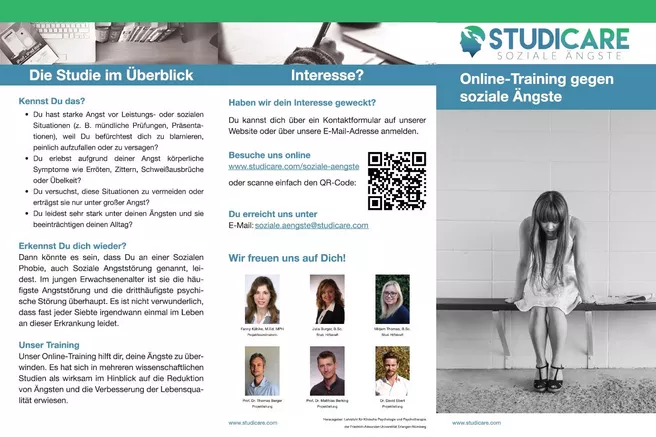For many young people, studying means freedom: their first apartment, meeting new people away from their usual environment, or attending parties. However, the daily university routine can also mean a lot of stress for budding academics. Social anxiety disorder (SAD) is a frequently occurring illness that affects everyday life. University students, in particular, are at a stage in their lives when mental health problems can peak and can come at a high cost to society.
Dr. Fanny Kählke, Research Associate at the Assistant Professorship of Psychology & Digital Mental Health Care, investigated an online intervention in terms of its long-term effects (after six months) on reducing SAD symptoms and cost-effectiveness. The study was published under the title “Long-Term Outcomes and Cost-Effectiveness of an Internet-Based Self-Help Intervention for Social Anxiety Disorder in University Students: Results of a Randomized Controlled Trial” in the journal “Depression and Anxiety” (Wiley). The journal has an impact factor of 7.4.
"Students with social anxiety disorder are often reluctant to seek help, for example, at counseling centers, due to prejudice and social anxiety. One possible solution is a low-threshold online-based intervention, which has proven effective. This offers an effective way of helping those affected and reducing costs," explains Dr. Kählke. To this end, 200 German-speaking students suffering from SAD were identified. The diagnosis was confirmed using telephone interviews. The participants were then assigned to an intervention or control group.
The intervention consisted of nine weekly modules containing various components. The participants received information texts about the disease and its causes and interactive exercises to reflect on their behavior. "In the intervention, the participants learn to understand their disease model and identify factors that maintain it," explains the Research Associate. They also kept diaries and identified avoidance behavior, which they were asked to change through exposure. The aim was to reduce symptoms and anxiety.
“Avoidance behavior increases social anxiety in the long term. This particularly affects students, as they can avoid social interactions more easily than other social groups, such as pupils. In addition to avoidance patterns, safety mechanisms such as the constant presence of friends or carrying a talisman also occur”, explains Kählke.
Overall, the study results show a promising outlook for those affected. The stability and strengthening of the effects over six months suggest that the program offers long-term benefits. "Our study confirms the effectiveness of internet-based self-help interventions for social anxiety disorder. The positive effects suggest that implementing these interventions should be an essential component of student health management at universities", adds Kählke.
By comparing the costs between the control and intervention groups, it was also found that the intervention resulted in considerable cost savings. Among other things, this was reflected in reduced visits to the doctor, lower medication costs, and fewer days of absence (absenteeism). At the same time, the effect of the intervention was significantly more significant in the intervention group than in the control group, representing an optimal combination of greater effectiveness and lower costs. Even without additional willingness to pay, the intervention proved cost-effective, which underlines its importance in the health management of those affected.
"Our future research will now focus on developing and evaluating resilience and procrastination interventions. We plan to offer a blended therapy that combines online interventions and face-to-face counseling to optimize (cost) effectiveness and cost efficiency. Our goal is to provide effective support to more people, especially those hesitant to seek counseling," concludes Fanny Kählke.
The joint project was carried out in cooperation with the Friedrich-Alexander University Erlangen Nuremberg, Amsterdam Public Health Research Institute, the University of Bern and the University of Ulm.
To the publication ”Long-Term Outcomes and Cost-Effectiveness of an Internet-Based Self-Help Intervention for Social Anxiety Disorder in University Students: Results of a Randomized Controlled Trial" in the journal "Depression and Anxiety"
To the homepage of the Assistant Professorship of Psychology & Digital Mental Health Care
Kontakt:
Dr. Fanny Kählke
Assistant Professorship of Psychology & Digital Mental Health Care
Georg-Brauchle-Ring 60/62
80992 München
Tel.: 089 289 24966
E-Mail: fanny.kaehlke(at)tum.de
Text: Bastian Daneyko
Photos: private

